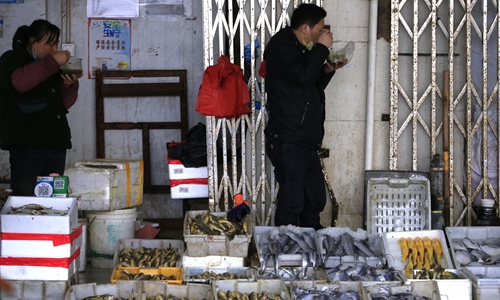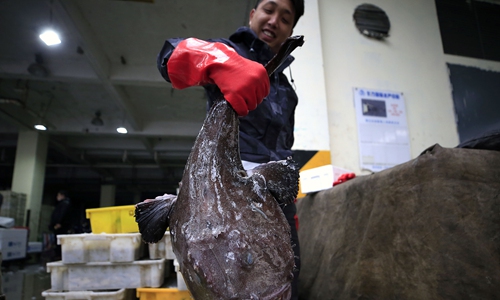GT Exclusive: Guangdong authorities clamp down on wildlife trade after SARS stigma
By Yang Sheng in Beijing Source:Global Times Published: 2020/4/14 1:08:40

Two seafood vendors eat their lunch before another wave of customers arrive at a wet market in Shanghai on Saturday. Photo: Yang Hui/GT

A vendor shows off a fresh anglerfish to buyers at Shanghai Orient International Aquatic Product Center, one of Shanghai’s main seafood exchange venues. Photo: Yang Hui/ GT
For instance, paguma lavarta was believed to be the intermediate host of SARS in 2003, but only some paguma lavartas in that year carried the virus and the animal is not the only intermediate host.
Since then, Guangdong has put in place strict control over the wildlife trade. Wang Xiufen, a Guangzhou businessman familiar with the wildlife industry, said many wildlife animals aren't health hazards as people have been using their products for decades, even longer.
"The coat of paguma lavarta could be used to make clothes and the bone of the animal is medicinal. If the industry gets banned, many people would be affected, so it is not easy. The stigmatization of the wildlife business is not entirely based on science, and it harms the interests of many farmers here. The majority of the people here don't eat wild animals. The outside world should understand it is not fair to judge China and Guangdong with imagination and prejudice," he said.
Many Guangdong locals said that people in the province eating "anything that flies except a plane, and anything with four legs except a table" is just a stereotype.
No wild animals could be found at markets in Guangzhou, capital of South China's Guangdong Province, said Yang Yang, a local law enforcement official in charge of aquatic and animal market management.
In the Huangsha Seafood Market in Guangzhou local law enforcement and social management officials have already enforced strict measures to test body temperature when people entering the market. Huangsha is also the biggest wet market in South China.
The public health standard remains high, and all restaurants and seafood stores require their customers to wear masks, and no wild animal could be found in the market. The market along the Zhujiang River has always sold seafood.
Fresh seafood is transported mainly by boats from regions like Hong Kong and other coastal areas in South China to the market, and many restaurants and food stalls around the market are very popular with locals and tourists, as these restaurants and food stalls will also cook the fresh seafood on-site and immediately.
Yang Yang, the local law enforcement official, told the Global Times that "in late March, the market underwent a major inspection. Relevant authorities on epidemic prevention and control already made a quick move to ensure the public health and safety of the market."
Yang said it is ridiculous for US politicians to stigmatize and blame China's wet markets for spreading COVID-19 and causing a global pandemic, and even urging China to shut them down.
"Scientists have not said where the virus originated from, so shutting down all wet markets in China could just ignore the true origin of the virus, and this will threaten mankind's safety," he noted.
Some Guangzhou locals who love to eat seafood said the US should pay attention to its own mess, and not lecture China on what to do.
RELATED ARTICLES:
Posted in: SOCIETY